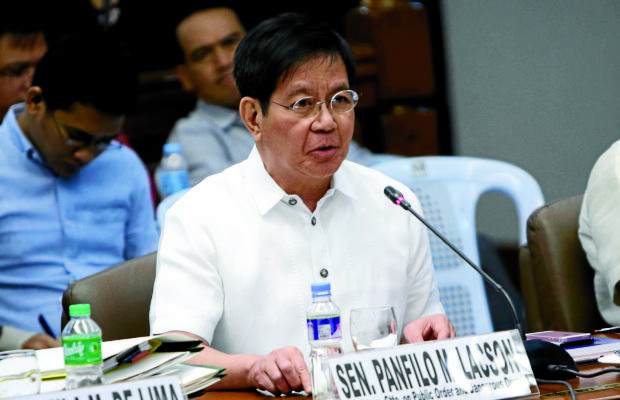Lacson: Why not use pork to fund free tuition law?

Sen. Panfilo Lacson. INQUIRER FILE PHOTO / RICHARD A. REYES
Get rid of the congressional pork barrel to raise the P20 billion to P25 billion needed to provide free tuition in state universities and colleges (SUCs) next school year.
That’s the solution of Sen. Panfilo Lacson, who has so far eschewed his annual allocations from the priority development assistance fund (PDAF), or pork barrel.
Lacson, in text messages on Sunday, said the P29.3-billion annual PDAF allocation for congressmen and senators was “more than enough” to cover the estimated cost of providing free college education, albeit for SUCs only.
He meant the discretionary funds allotted to lawmakers—P300 million each for senators and P80 million each for congressmen.
Last week, President Rodrigo Duterte signed Republic Act No. 10931, or the Universal Access to Quality Tertiary Education Act, which mandated the government to provide free tuition and other miscellaneous fees for SUCs, local colleges and universities and state-run trade schools.
SC ruling
Mr. Duterte signed the law despite opposition from his economic managers, who estimated the implementation of the entire law might cost the government P100 billion—a figure heavily doubted by senators, who put it at P20-25 billion.
“My appeal is, can’t we forget the pork barrel since the Supreme Court has already made a ruling against it?” Lacson said in a radio interview on Sunday.
In 2013, the high court declared lump sum appropriations under the PDAF as unconstitutional following widespread public uproar over an alleged P10-billion scam involving the diversion of funds meant to lift rural poverty to ghost projects and fake foundations.
The high court also disagreed with the practice of lawmakers to intervene, assume or take part in any of the various postenactment stages of the budget execution.
Lawmakers were allowed to identify projects, modify or revise the identification of projects, as well as allow fund release and/or fund realignment.
The Department of Budget and Management this week will meet with agencies overseeing tertiary education to determine the number of beneficiaries and source of funding for the SUCs law.
“I will meet with Commission on Higher Education (CHEd), UniFAST (Unified Student Financial Assistance System for Tertiary Education) and Technical Education and Skills Development Authority officials this week to assess the scope of the law and the funding requirements in 2018 and the ensuing years under President Duterte’s watch,” Budget Secretary Benjamin Diokno said in a text message on Sunday.
Diokno will head the committee that will prepare the implementing rules and regulations of RA 10931.
School year 2018-19
“We will implement the law; it will not be one of those unfunded laws. But the law is prospective. It will start with academic year 2018-19 since this year’s academic year is already funded,” Diokno said.
The budget chief on Friday said the law’s implementation would begin in the first semester of the next academic year.
The sources of financing will follow the funding needs of the law, which will be defined by the number of beneficiaries, he said.
“Many numbers are being floated around—for example, 900,000, 1.7 million or 2.5 million. Hence, we have yet to agree on the total cost of quality, free tuition for the tertiary education program and how it will be funded,” Diokno said.
Finance Secretary Carlos Dominguez III told reporters on Friday that he agreed with the points raised by Diokno on the free tertiary education law.
For Diokno, “my immediate concern is those enrolled in the 114 SUCs,” he said.
Student population growth
“There should be no expansion in student population. The estimate has to be preceded by the number of predetermined students who are chosen, say ‘x’, on the basis of a nationwide test administered by the CHEd. Unless we know ‘x’, we can’t give an estimate,” Diokno said.
He added: “There will be changes in the President’s 2018 budget, which has some P16 billion in various types of scholarships.”
During the first congressional hearing on the proposed P3.767-trillion national budget for 2018 last week, economic managers said a whopping P100 billion would be needed to fully subsidize tuition in SUCs.
Instead of free tuition in SUCs, the Duterte administration’s economic team was pushing for the implementation of a 2014 law that unified and harmonized all financial assistance for students.
Economic managers said that the government must fully implement the UniFAST under RA 10687.














